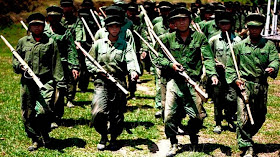Rebels from the Kachin Independence Army (KIA), an ethnic armed group, destroyed a section of a major railway in northern Burma on Wednesday in an effort to deter the Burmese military from resupplying its troops in Kachin State.

A section of the commercially-strategic railway from Mandalay—Burma’s second largest city—to Myitkyina in Kachin State was blown up by KIA troops at midnight on Wednesday to prevent a cargo train suspected of carrying government military supplies from passing, said KIA spokesman La Nan.
There are reports that the attack, which occurred in Mogaung Township in Kachin State, injured at least one civil railway staff onboard the train. The KIA spokesman, however, claimed that the attack did not target the train and did not cause any injuries or deaths.
“We just bombed the railway section, as the government troops and arms supplies have been reinforced in Kachin State on a large scale,” La Nan said, adding that there were more than 160 armed clashes between the Burmese military and the KIA in October alone, during which 14 KIA rebels were killed and 26 wounded.
Many similar armed clashes continue to break out in Kachin and Shan States, and the conflict between the KIA and government troops has created thousands of refugees along the China-Burma border. In addition, human rights groups claim that serious human rights violations, such as rape and the burning of villages, have been perpetrated against locals by the government troops.
To independently verify such reports is almost impossible since the conflict zones near the China border are located in difficult terrain and are thus inaccessible to the local and international media. The Burmese authorities have also denied international aid groups access to the conflict zones.
Both the Burmese and Chinese governments have avoided official media coverage of the clashes, which began in June after the collapse of a 17-year-old ceasefire between the KIA and the Burmese government. It is important to both governments to stabilize the region, through which an oil and gas pipeline that is being built by China and a railway from Burma’s coast on the Bay of Bengal to China's landlocked Yunnan Province will pass.
The US $2.6 billion pipeline project is currently under construction and is expected to become operational by 2013, while construction on the $20 billion railway will begin in December.
KIA sources said that the continued fighting will pose difficulties for Burma and China in completing these projects.
Founded in 1961, the 10000-strong KIA is fighting for autonomy for the Kachin people and has rejected the current military-drafted Constitution as not granting equal rights to the ethnic groups. The KIA also did not accept recent offers from Burma’s new quasi-civilian government to participate in the national Parliament and have said that a political dialogue with Naypyidaw is a requirement for any renewed ceasefire.
Recently, Naypyidaw has signed renewed ceasefire pacts with other ethnic armed groups, including the United Wa State Army, the country’s largest ethnic armed group which operates in Shan State, and a breakaway faction of Democratic Karen Buddhist Army in Karen State.
The clashes in Kachin State have created a sense of caution amidst the optimism of the international community over certain reformist steps recently taken by the Burmese government, including overtures to opposition leader Aung San Suu Kyi.
Reflecting the contrast between the reform measures and the continued armed conflicts, US Secretary of State Hillary Clinton said on Thursday that the government needs to take more steps in its reform process.
“Now, many questions remain, including the government’s continued detention of political prisoners, and whether reform will be sustained and extended to include peace and reconciliation in the ethnic minority areas,” she said.
http://www.irrawaddy.org/article.php?art_id=22440

No comments:
Post a Comment